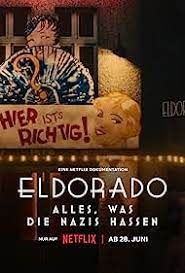
EL DORADO: EVERYTHING THE NAZIS HATE
Germany, 2023, 93 minutes, Colour.
Directed by Benjamin Cantu and Matt Lambert.
This is a documentary, mainly about Germany in the 1920s and 30s, and a postscript in 1945 with the Allies opening of the concentration camps. There is also dramatised footage, especially recreating the El Dorado club in Berlin in the 1930s. There is also a dramatisation of the personalities and careers of tennis player Gottfried Von Cramm and his wife.
The cowriter-director, Benjamin Cantu, made a documentary some decades earlier focusing on paragraph 175, the German edict about homosexuality (which continued after the war and was revoked in 1994). While this film is for the general public, it seems specifically made for the LGBTQI+ plus community.
But, as a documentary, it is something of a mix-gatherum, changing focus throughout the film. Themes are taken up, then left, and not all of them brought to conclusion.
There is a dramatisation of life at the El Dorado club, the gay men and women who frequented it, finding it a sanctuary, the style at the club, behaviour, dancing, drugs, sexual liaison is. Some of this is more than a touch crude – but memories, bitter memories, of Cabaret. There is a focus on SA leader, Rohm, and his frequenting the club, his liaisons, but also his anti-homosexual stances concerning what it is to be a dominating Aryan male, leading to misogyny. Some of this is dramatised.
However, the club is left (and a finale indicating that it is an upmarket food store in the present).
The documentary-style of the documentary seems more interesting. There are several experts, an emphasis on trans people, information about transgender procedures in Berlin in the 1930s and the consequences, especially for two women. Some of the commentators are also trans.
There is a great deal of footage showing Hitler, close-up, and the crowds in adulation. There is footage of Hitler and Rohm, the parades, scenes of the SA men together (dramatised effectively by Lucchino Visconti in The Damned), Rome’s presumption about Hitler tolerating him as long as she was private, his arrest – and glimpses of Krystalnacht from this perspective of the persecuted Jews. And then there is the footage of the liberation of the camps.
The story of Gottfried Von Cramm could have been a film in itself. In the dramatised sections, there is a reaction to him and his wife, the marriage, the open marriage, their behaviour, relationships. But Von Cramm was a champion tennis player, admired throughout the world, gracious in defeat, giving interviews about his not identifying with National Socialism. When he eventually returns to Berlin after a world tour, he is arrested, ostentatiously, the regime making a point about his sexual orientation and behaviour, and his imprisonment – and the attempt in 1951 to have these charges removed from his record, a court case, and with his partner before the war returning to Germany for the case.
The other story is the highlighting of two young friends, one from Hungary, one from Vienna, who meet on holidays, fall in love, have a distant relationship, the Hungarian disappearing into the concentration camps, the other, Walter Arlen, speaking to camera about the relationship, it being revealed that he is aged 100, was able to move to the United States, found a partner, had a successful career as a musician and composer.
Quite a lot of interesting ingredients but the film and its structure and interconnecting of stories and dramatisations, something of a mess.